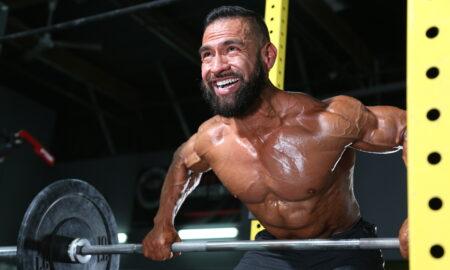Q: What’s your take on having a training partner? Is it best to train with a partner or alone?
A: Neither—I’ve found that the ideal way to create the most anabolic environment is to have two training partners. Here are five good reasons:
First, not everybody is up for every workout every day. Typically, one person will be up, one down and one somewhere in the middle. The leader of the day will help keep the average up. Group dynamics will always boost individual training drive, especially when bets and competitions are involved. Healthy competition brings out the best in people.
Second, a team of three is ideal for all training systems. Let’s say the group is training dips and chins for relative strength. Here’s how the sets could progress:
The weakest person goes first, and each just keeps adding weight until the last one goes; then everybody starts over. For example, Albert goes first, Bob goes second, Carl goes last. Then they repeat.
Here’s how that same group would operate when training for functional hypertrophy, which involves a shorter rest interval:
Albert starts on chins, Bob starts on dips, and Carl waits his turn. This rotation keeps the rest interval optimal.
Third, someone is always better than the others when it comes to a specific bodypart or lift, and that difference brings about healthy competition.
Fourth, when training in teams of three, changing the weights and cleaning are a cinch. When lifting bumpers off the end of a barbell used for deadlifts, one lifter can clean one end of the bar off the floor while another easily pulls the weight off the bar.
Fifth, experienced lifters won’t need stopwatches, as the length of the pause between lifters performing their work sets will be ingrained into their internal clocks.
The only hurdle comes when group synergy is at odds with individual training goals. For instance, if one member wants to be a bodybuilder, one wants to be an offensive lineman, and the third wants to be a powerlifter, the program design will center on making compromises. In that case compromise is not a good thing.
That’s my sales pitch. Bottom line: If you can find two other colleagues with the same training goal, you’ll have an outstanding shortcut to success.
Editor’s note: Charles Poliquin is recognized as one of the world’s most successful strength coaches, having coached Olympic medalists in 12 different sports, including the U.S. women’s track-and-field team for the 2000 Olympics. He’s spent years researching European journals (he’s fluent in English, French and German) and speaking with other coaches and scientists in his quest to optimize training methods. For more on his books, seminars and methods, visit www.CharlesPoliquin.net. IM




















You must be logged in to post a comment Login